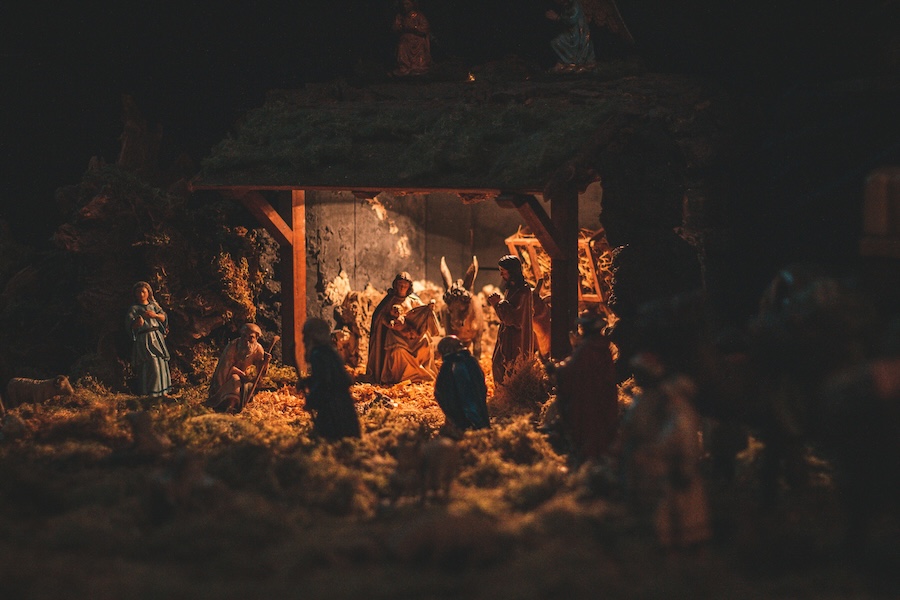Was God ever born? Surely not if we’re thinking of the eternal God of the Bible. How can there ever have been a time when the Creator of time was not alive?
Yet there is another sense in which maybe God was born. Isn’t this what the Christmas miracle is celebrating? God identifies with us in Jesus, assumes the flesh and blood of our humanity, and is born among us.
You may unsubscribe from any of our newsletters at any time.
Jesus doesn’t just materialize out of thin air. He comes to us from a woman’s womb having undergone a nine-month gestation. He squeezes through a human pelvis and suckles at a human nipple. He experiences first-hand, personally and intimately, what it means to be a child, an adolescent, an adult.
Yet how can God be a child in Jesus when Jesus himself looks heavenward and calls God “Abba,” “Daddy,” “Father”? This question was eventually answered when the early church began using the model of the Trinity.
Yes, the early Christians said, God is the Creator beyond and above all things. But God is not a prisoner of the Godhead. God is free to come low and be born among us while remaining in the heights of heaven.
This is so because God’s oneness is dynamic. God is able to be both the Father relating to the Son and the Son to the Father in the mysterious unity that is God’s Spirit.
This is all too mysterious, say those today who would rather just believe that God is everywhere and leave it at that. God is in you. God is in me. God is in Jesus — only perhaps more so. Deep down, all of us, these people say, are divine.
More on Broadview:
Such thinking is known as “pantheism,” and it’s not just Christians who are attracted to it. Pantheism is the official position of Hinduism, the oldest living religion in the world. Pantheists can be extremely religious and not have to worry about the complicated theological puzzles that Christianity forces upon us.
Still, pantheism has problems of its own. To say that everything is God and that God is everything surely strains credulity. Was Hitler God? Yes, God did create Hitler. But can we really say that Hitler was divine if only we look deep enough?
John Shelby Spong has commended pantheism as the answer to all our theological problems. “Transcendence stands for the inexhaustible depths of the divine,” the Episcopal bishop and author writes in Why Christianity Must Change or Die. “Human life is capable of entering the infinity of God because the infinity of God can be found in the heart of every human life. The two are not distinct. Humanity and divinity flow together.”
When the 19th-century philosopher Georg Friedrich Hegel said more or less the same thing, Søren Kierkegaard protested. “The fundamental error of modern times lies in the fact that the yawning abyss of quality in the difference between God and man has been removed,” claimed the Danish theologian.
Swiss theologian Karl Barth made the same point in the 20th century when he spoke about “the infinite qualitative distinction between time and eternity.”
And of course the writer of Ecclesiastes said it ages ago: “God is in heaven, and you are upon earth” (5:2).
So if pantheism is not an option, where does that leave us?
I suggest we need to go back to the miracle of the Incarnation as understood along Trinitarian lines. God is beyond time and space and yet free to come low and be “born of a woman, born under the law” (Galatians 4:4).
And the Son of God, who is mysteriously one with the Father, is not only born under the law but grows up living under the law. The law of gravity. The laws of human society. The religious laws of his people.
There must have been times when Jesus wanted to break free from these laws. Perhaps he dreamt of turning stones into bread or leaping unharmed from the pinnacle of the temple or taking control of all the kingdoms of the world.
But no, Jesus remained under the law and experienced real human joy and sorrow, real human success and failure, real temptation and frustration — and at the end a real cross with real nails.
Christmas may be a time to stop looking for theological loopholes and simply rejoice in the mind-exploding miracle of the birth of God in the very human child of Bethlehem.
***
Rev. John McTavish is minister emeritus at Trinity United in Huntsville, Ont.














